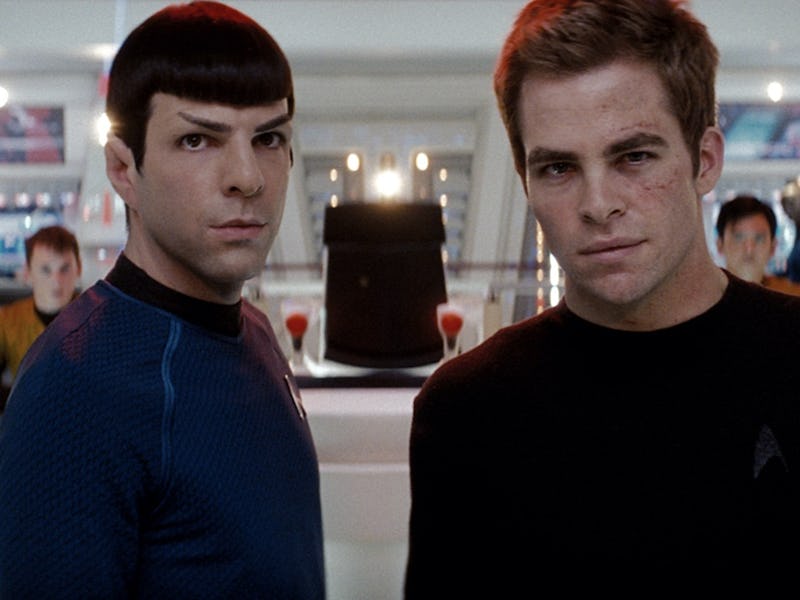15 Years Ago, J.J. Abrams Broke — And Then Saved — the Star Trek Universe
Star Trek is the rare sexy reboot that actually helped its flailing franchise.

The late 2000s suffered from a sci-fi vacuum, at least when it came to mainstream franchises. The Star Wars saga had seemingly ended (save for animated fare like The Clone Wars), and its biggest competitor, Star Trek, wasn’t faring too well either. It had been years since a new Trek series had captured the public imagination, and the fandom was running on nostalgic fumes.
Many recognizable properties have done more with less, and there’s nothing inherently wrong with using nostalgia to give a big intellectual property a second life. But in 2009, Star Trek chose to go a different way. J.J. Abrams — then best known for Alias and Lost — was chosen to reboot Star Trek on the big screen.
Rather than turning to the franchise’s expansive lore, Abrams’ take on Trek was much more dynamic. The non-stop, manic action he’d tested in Mission: Impossible 3 was on full display in Star Trek, albeit filtered through a glossier lens. It felt like Abrams came into his own with this outing; the director angled for a cool, modern reboot that seemed in line with the revisionist stylings of 2008’s Iron Man. He delivered in spades thanks to some much-memed lens flare, an alternate-history angle, and some late-aughts sex appeal.
In hindsight, Star Trek is the quintessential sexy reboot. Trek has never shied away from romantic tension, nor have its shows neglected to capitalize on the inherent appeal of its most popular characters. Still, the 2009 film had the juice to attract a younger audience, one that had never approached the final frontier from such an earnest perspective.
Star Trek’s updated cast brought the property into the 21st century without stepping on the original’s toes.
Star Trek went out of its way to recast its core group in the image of the era, tapping bombastic, lithe actors on the cusp of fame. It even featured a few almost-sex scenes, a rarity for the franchise. But it was all a ploy to contextualize the crew of the U.S.S. Enterprise anew, giving them modern sensibilities and more “human” desires. This updated cast was hot, but also hot-blooded. They felt things more deeply than their predecessors in The Original Series, and that extended to love and sex as much as their first mission.
Abrams has always introduced characters with visceral, masterful skill, and it’s no different here. He positions James T. Kirk (Chris Pine), known to most as the steadfast captain of the Enterprise, as the last person who should be granted a leadership role. He’s cavalier, headstrong, and suffering from serious daddy issues, the complete inverse of his future First Officer, Spock (Zachary Quinto). Their first brush at Starfleet Academy is framed as a blip, but they have many more opportunities to clash — and inspire a fervent new wave of fanfiction — in the adventure to come.
What makes Star Trek such a compelling reboot is its freedom from canon. The story begins when a Romulan ship accidentally drifts into a wormhole, creating a branched timeline and altering events diehard Trek fans know by heart. “Whatever our lives might have been,” Spock says, “our destinies have changed.” That’s as concerning as it is exhilarating; none of our heroes are safe. By that logic, though, they also feel more alive than ever before.
There’s an urgency to Star Trek’s character dynamics that brings some much-needed friction to the franchise.
Kirk doesn’t come to captain the Enterprise or befriend Spock in the way anyone expects, but there’s still an inevitability to the adventure that unfolds. Watching this cast gravitate towards one other and fit together in different ways is satisfying whether you’re familiar with canon or not. Their sex appeal is, again, helpful, as it brings a steamy friction to the screen. But each cast member is dialed in: they bring desire and urgency to every beat, be it a mile-a-minute action piece or a quiet bonding moment between frenemies.
Star Trek is charged from top to bottom, and it’s just as concerned with meaningful character development as high-tech space battles. You can’t get a new generation to invest in a franchise without giving them something to care about, and Abrams — with the help of screenwriters Roberto Orci and Alex Kurtzman — understood that better than most. Star Trek reminds us that these heroes bleed, love, and make mistakes. In bringing the Enterprise crew back to square one, the film also resets the stakes. That instinct restored the beating heart of a franchise that was close to fading into legend, and gave everyone something tangible to root for.